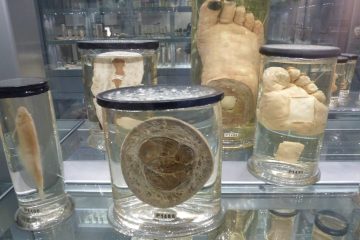
You can’t buy a Mitch Vowles. The Essex sculptor grafts on a construction site to fund his artistic output, and insists his craft would suffer if he started doing it for profit.

Two hundred years ago, a young English painter called John Constable knew that his lived experience informed his work. Constable realised that his early development was much more important than, and would be tainted by, financial incentive. He sought to stow away his designs from the eyes of buyers, instead poring over his flaws and constantly re-evaluating his progress, all the while ignoring his mum’s pleas to enter the market.
What happened next is common knowledge (his career took off, he made a fortune and became one of Britain’s greatest ever artists), but I’d travelled to meet another Essexman, in Colchester, just a short trip down the road from Dedham Vale which so inspired Constable.
Mitch Vowles, like John Constable in his early career, refuses to sell his art. Why? The artist can flourish in incubation only when money isn’t exchanging hands. When the artist’s impetus is focused on pure, unconditioned expression, rather than appealing to the buying crowds, he knows he can be totally honest with himself. But where Constable coasted financially into this long vacation of trial and error (his father was a wealthy corn merchant), Mitch must earn the time and materials he uses, on a construction site, through hard graft and his bare hands.
Mitch’s teenage years were spent like any other English lad maturing into early adulthood – a time when, in modern society, we expect young people to cast a stone onto their chosen path. Many people, like Mitch, thought the decision far too important to make so early, and so he focused on what mattered to a 16-year-old. ‘I always had this trade to fall back on, floor laying,’ Mitch recalls, ‘my dad and two of his three brothers all did it but I didn’t wanna know. I just wanted to piss about with my mates, muck about on mopeds, bunk off school, chasing skirt and that.

‘It didn’t take too long for that to get boring, obviously. I started to get this uneasy feeling that I’d fucked it all up. Even though it was great being one of the boys, not really caring, happy just grafting, earning okay money and spending it down the pub with your mates, I knew while I was doing it that there’s more to this. There’s more to life than what you’re doing now.’
All Mitch could think about during that period was escape. Escape from Colchester, from Essex, from England. He jumped at the chance to see Berlin when a friend invited him, seeing for himself the wider, euphoric world that appealed to two Essex lads like nothing else. His Grand Tour of Berlin nightclubs and dizzying new scenes activated the dormant artist inside him, and when he came back to Colchester, he knew what he needed to do.
View this post on Instagram
But his dropout and attendance record was against him. And so it took determination, skullduggery, pleading and eleventh hour deals with college tutors for Mitch to land himself a place on an art foundation course.
‘The tutor said that if I could prove to him over three months that I could make it work, he’d accept me. I have never applied myself like I did then, mate. I’ve never made as much of a mess or taken as many risks and chances as I did in those three months. I came alive. That’s when I just knew. I kept thinking, ‘What the fuck is this? This is something else.’ I was also conscious of how much I wanted to get to uni to do an Erasmus year and fuck off to Berlin again! But… this was it.
I made so much work in those three months to prove it to my old man, myself, and this guy at the college.’
‘I spent all this time making these huge installations in a derelict petrol station near my house, taking videos, making performances, painting soundworks – you name it, mate. All day, every day. It weren’t a nine-to-five, it was like a nine-to-nine. It was solid, mate. I made so much work in those three months to prove it to my old man, myself, and this guy at the college.’
It paid dividends. Mitch was accepted by Chelsea College of Art, one of the most prestigious higher education arts institutions in the country. ‘I was told it’s pretty sought after. Not many get in from out this way so I didn’t know. I’d grown up in Tottenham until I was ten and only knew the grimey bit of London.




‘No offence to Tottenham but it weren’t a nice place for me, mate. We had to move because of how rough it was getting. We were getting burgled loads and the street we were living on was changing. My idea of London after I’d moved to Colchester was quite grey and dark. But Chelsea and the art college, it was posh. I’m not that type and I’d never known that part of London.’
Like many working-class arts undergrads, Mitch felt like an imposter in an environment filled with erudite and confident peers, but this is from whence his inspiration sprouts. ‘The work comes from me, with me as the subject, told in autobiographical language. Before, I was trying to be like a drop of oil in a pint of water.
I was trying to be like a drop of oil in a pint of water.
‘At Chelsea there wasn’t the space for what was going on in my life. So, I just made the boldest, biggest things, and was really unapologetic the whole time. I just went for it. That birthed in me a kind of variant. Before, I wasn’t even interested in art – I just liked Mark Lecky. But Chelsea made me interested. I started going to shows and immersing myself in other people’s work.’
Mitch went on to win the Studio Prize, now discontinued, awarded to one UAL student out of each annual cohort. A London studio for a year and a healthy bursary – tripled with a team of dedicated mentors who assisted Mitch’s transition from graduate to professional – allowed him to concentrate much more on introspection. ‘I’m making these sort of shrines to this pre-existing state or feeling I have of myself. This millennial moment in the early 2000s, the pre-internet years, Essex.’


It’s this refusal to settle with the idea that his environment and lot in life is prosaic that sparked Mitch’s love affair with snooker. On the surface a relaxed, ambulatory sport, snooker is in fact a game in which precise movements at hairline fractions can make or break you or your opponent. Microscopic feats of brilliance are often lost to the eye, but the compensation for the viewer is the seemingly effortless grace in which the players bend and stretch across the green expanse.
It’s reassuring for the art enthusiast to find a British sculptor like Mitch who has identified himself so resolutely with an object that has featured in Britain’s social settings since its invention. It’s an unbreakable connection on every level, because these tables become the perfect canvas for a working-class Essex artist to re-examine his own life in a Proustian way. He’s found what most of us wish we could: a focal point to pour all of our emotional energy into and somehow find out more about ourselves and our purpose in life. And fair play to Mitch, now he’s found it, he won’t let go: his vocation is an object that signifies a pastime, rather than in an activity itself.
Art’s treacherous, mate. It’s a real risk, but I’m not in it to make money.
And it’s a humble one. The snooker table doesn’t demand anything of its admirers who congregate around it. They need not have expensive tastes, belong to a certain class, enjoy exotic cultures or yearn for a high and exclusive art form. Snooker tables invite the rich, the poor, the drunk and sober, the young and the old, the idle flaneur and the short-fused businessman. In this philosophy, Mitch has everything he needs for this life and the next, and knows he’d corrupt that good fortune in an instant if money muddied the pool.
‘Art’s treacherous, mate. It’s a real risk, but I’m not in it to make money. The less privileged have to work. The only way I can earn the money is graft my bollocks off picking up heavy things and constructing walls. It’s clear who’s trying to make money in their art. My work’s not universal. It’s not neutral. Those things sell. Look at that, it’s a fucking snooker table, mate. It’s not a commercialised product. Art’s about community, not commerce, and I’ll never stop making tables, mate, I fucking love doing it.’


